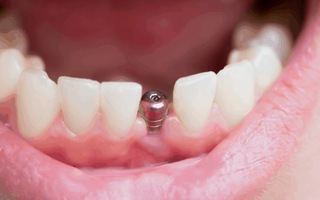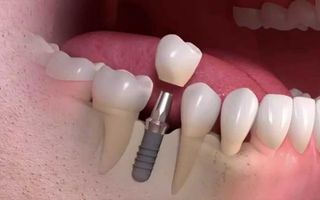
Dental Implants
The best treatment for replacing a single or multiple teeth.
What are dental implants?

Dental implants are permanent replacements that look, feel, and function like natural teeth, making them a popular choice among individuals seeking permanent tooth replacement solutions and a natural-looking smile.
Our goal at 818 Dental is always to preserve your natural teeth, but when that’s not possible due to decay, trauma, or other factors, dental implants are an excellent option.
An implants consist of three parts:
Types of Dental Implants
There are three common types of dental implants that are available, all of which are dependent on your individual needs and the existing health of your remaining teeth and gums.

Single and Multiple Implants
These replace one or more missing teeth with titanium implants that fuse with your jawbone. After healing, we place a custom-made crown that blends in with your natural teeth. Treatment can take 4 to 9 months, depending on whether additional procedures like bone grafts are needed.
Implant Supported Bridges
For multiple missing teeth in a row, an implant-supported bridge can offer a secure and stable solution. Unlike traditional bridges, which rely on neighbouring teeth, this option uses implants to anchor the bridge, providing a more durable and comfortable fit.
Implant-Retained Dentures
If you need to replace several teeth or a full set, implant-retained dentures offer a reliable alternative to traditional removable dentures. These dentures clip onto implants, making them more stable while still allowing easy removal for cleaning.
What to expect during your Dental Implant treatment?
Your dental implant journey starts with a consultation. We’ll refer you for a 3D CBCT scan to assess your jawbone and determine if an implant is right for you. Our in-house specialist, Dr Nabil Ishak, with over 30 years of experience in surgical dentistry, will guide you through the process.
Step 1: Consultation
Dr Ishak will review the CBCT scan to determine how much bone we have to place the implant. Sometimes there isn’t enough bone, and grafting is required but that will be discussed during your consultation.
Step 2: Recovery
Over the following months, you will need to wait 10-12 weeks for the implant to integrate with the bone and then you return for a 3D scan to send to our dental ceramist to create your new crown. A crown will be designed and manufactured so it matches your natural teeth in shape, size, and colour.
Step 3: Implementation
Finally, the crown is then permanently attached to your implant via a screw mechanism and a matching tooth-coloured filling seals the top of the crown invisibly guaranteeing future access if required the artificial tooth will be attached to the implant, resulting in a fully functional and aesthetically pleasing replacement tooth.
How long is the recovery time?
Each procedure that you undergo for your dental implants will take between 30 minutes and a few hours. After surgery, it's common to experience some swelling, bruising, or minor pain. Your dentist will prescribe antibiotics before surgery to ward off infection.

Depending on the complexity of your case, you may have to take some time off work to recover. You may also need pain medication to help ease your discomfort. Depending on the type of implant you receive, your jawbone and gums will heal fully within a couple of months.
Why is a dental implant a good choice?
If you permanently lose a tooth, it can cause further deterioration of your oral health. For example, tooth loss leads to loss of bone in the jaw, which may cause the face to look sunken. Additionally, getting a dental implant replacement will help you to continue eating as normal, and it will fill any gaps in your smile.
This is why it’s a good idea to have a dental implant.
Other options include dentures and bridges. However, traditional dentures and bridges fit over the gums and jawbone but do not attach to it. Because dental implants are surrounded by the natural jawbone and gum tissue, they're often preferred over dentures and tooth-supported bridges since they stimulate new bone growth. This is especially the case when your teeth are weak, or when previous disease to the ligaments and jawbone has occurred.

We understand the importance of a healthy smile and the impact it can have on your overall well-being. Dental implants provide a permanent and natural-looking solution for missing teeth, restoring your oral function.
Speak to a dentist about dental implants
If you are missing one or more teeth or your lower denture doesn't fit properly, dental implants may be a good option for you. However, only a qualified dental professional can make that determination. Your health, and the condition of your teeth, gums, and jawbone all play a part in the decision process.
If you think that dental implants may be the right option for you, or if you want to learn more about them, please contact us to schedule an appointment. Our friendly, professional staff will answer all of your questions and address any concerns that you have about the procedure.
Frequently asked questions
The cost of a dental implant can vary quite dramatically depending on a number of factors, such as if you require more than one implant, the type of dental implant required (for example, All-on-4 dental implants) or even the type of materials used.
During the procedure, you shouldn’t feel any pain as your dentist or oral surgeon will apply anaesthetic. In the days following each procedure you may feel some tenderness or pain, which can be managed with over-the-counter pain medication.
Yes, dental implants are usually a good option for your oral health. Speak to your dentist about whether they would be suitable for you.
As with natural teeth, it's important to properly care for your dental implants to avoid issues. That means thoroughly brushing your teeth and rinsing out your mouth to remove debris and plaque. You'll also want to continue getting regular dental check-ups. If you neglect your dental hygiene after you've received dental implants, plaque and gum infections can occur because they're bonded with the jawbone and gum tissues.
Dental implants are made to last, so technically speaking, they should last a lifetime. Regular check ups and proper care will ensure their longevity. If anything, you may need a new crown after 10-15 years if your existing one begins to wear down or crack.
Your dentist will advise you on whether or not you are a good candidate for dental implants.
Generally speaking, children and teens are too young for implants as their bones are still developing, smokers are advised to quit if they want an implant because the habit can cause bad outcomes with the healing process, and those who don’t take good care of their teeth may also not be good candidates as you will need to look after your oral health for the implant to work.
Additionally, those in advanced age may not be advised to have implants, as they may not heal as well as required.
Each procedure takes anywhere from 30 minutes to 2-3 hours, depending on what’s needed.
Dental implants require minor surgeries, which means there are some risks involved. These include; infection, sinus problems, injury, or nerve damage. Although these are not the norm, it is best to speak to your dentist about the risks involved with your specific case.




